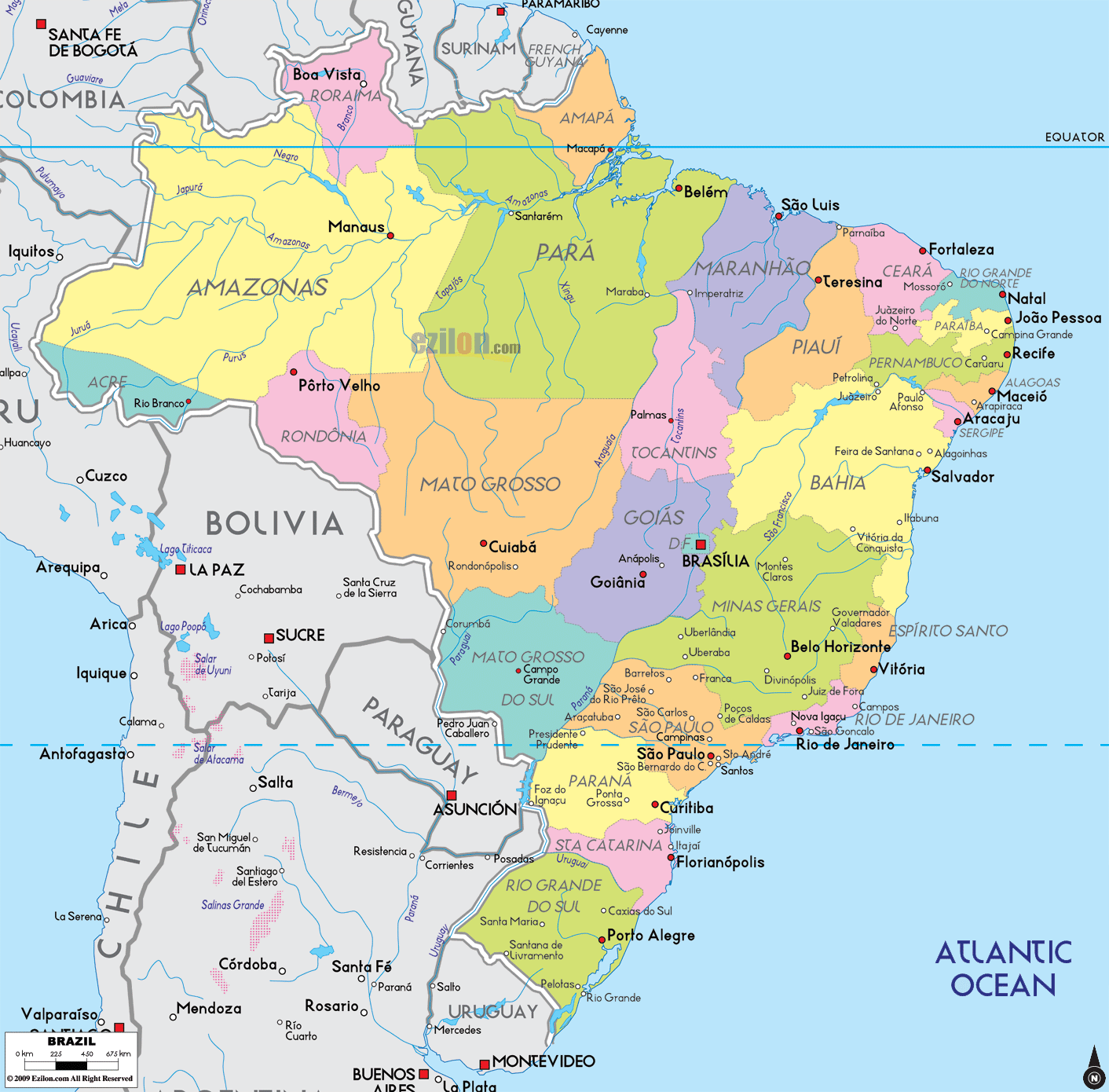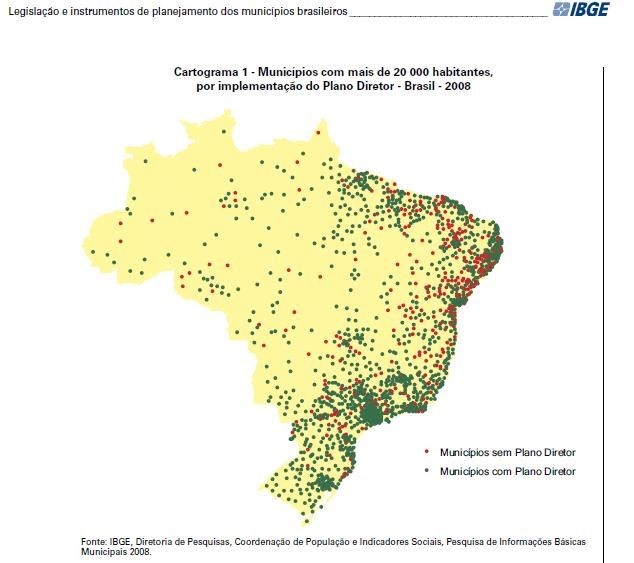Abstract
The Brazilian Constitution of 1988 states that municipalities (cities) are part of the federal union. This statement reflects the relevance of local governments in Brazil’s federation. The federal structure does not guarantee municipalities the same level of federative ground the states have. However, municipal competences and roles established by the constitution and the dynamic of Brazilian federalism have shown a high level of participation of local governments in Brazil’s federation.
Introduction
The Brazilian Federal Constitution of 1988 (CF-88) states in Article 1: “The Federative Republic of Brazil, formed by the indissoluble union of the states and municipalities and of the Federal District, is a legal democratic state (…)”. Another official document, Brazil’s National Report to the UN Habitat III (2015), declared that “Brazil is considered a highly decentralized country since the 1988 Federal Constitution, which raised municipalities to the status of federative entities, in equal terms with states and the Union.”
Are there other federal countries that include municipalities (cities) as official parts of the federal union? With such a constitutional ground and level of clarity, probably not. Almost all federations are dual, formed by the states and the union. Undoubtedly it is not by chance that municipalities are declared part of the union in Brazil. The importance of local power in Brazil has been a matter of fact since colonial times. Nevertheless, the constitutional statement does not mean exactly what it promises, albeit the relevance of municipalities today is high and continues to increase in many fields, ways and aspects.

(Map of Brasil)
The aim of this article is to review the place and role of municipalities in Brazil’s federalism and show how cities play an important role as part of the Brazilian Federation.
Municipalities in Brazil
Municipalities were the first public entities created by Portugal in Brazil, during the colonial period (1500-1822). They were self-governed through their municipal councils (Camaras Municipais) and have their own local laws. With the advent of the Republic and the adoption of federalism (1889-1891), municipalities retained their autonomy but did not gain any different status in the new Brazilian federation. Besides, local political movements engaged in approving municipal constitutions were blocked by the new states and federal authorities. Municipalities, however, have had organic laws, which, in practice, function as local constitutions. Mayors (prefeitos) are elected through direct vote as well as municipal councilors (vereadores) for four-year mandates with one re-election allowed. Municipal legislative and executive powers are separate, in line with the presidential system.
Nowadays, according to the Brazilian Institute of Geography and Statistic (IBGE), the main federal branch responsible for the country’s public data, Brazil has 5.570 municipalities (2016). Federal urbanistic law (Cities Statute, 2001) states that all municipalities with 20.000 inhabitants or more should approve an urban plan (Plano Diretor), a municipal law that should be based on a participatory and technical process, which regulates the uses and disposition of the whole municipal territory. The urban plan is a crucial instrument for public planning, but also for emphasising municipal autonomy. According to the Research on Basic Municipal Information (MUNIC-2015), from 1.742 municipalities with more than 20.00 inhabitants only 188 (10,8%) did not have an urban plan.

(Municipalities without urban plan (less than 20.000 inhabitants) in red; and with urban plan (more than 20.000 inhabitants) in green. Source: IBGE, Brazil, 2008.)
The map above (IBGE, 2008) shows cities with and without urban plan in Brazil. There is a great concentration of most populated municipalities in the South and Southeast regions (the most economically rich), as well as in the coastal zone, this last one as a heritage of the historical occupation of the country. In fact, Brazil has 80% of its population concentrated in urban areas, much more than the world average (60%, according to the World Bank), putting municipalities at the core of many polices in the federation.
Channels of Political Representation and Intergovernmental Relations
As a federation, Brazil has a Senate in which its 26 states plus the Federal District are represented through a symmetric architecture, each state having three senators elected by the people. One basic question in this matter is the following: as constituent units, do municipalities have representation in the Senate? The answer is no. In fact, Article 46 of the FC-88 states: “The Federal Senate is composed of representatives of the States and the Federal District (…)”. This absence exposes one of the contradictions of the so-called three-tier federation, in which one of their three pillars is not equally represented in the upper house. There is no mechanism of municipal representation in Congress at all, even one without the right of vote, such as South Africa’s seat for SALGA (South Africa Local Government Association) in the Council of Provinces.
Due to the lack of institutional channels to vocalize municipal interests, strong municipal networks, regional and national, have developed during decades after the approval of the new constitution. Today, there are three national associations representing municipal interests: The National Confederation of Municipalities (CNM), mainly composed of small cities; the National Mayors Front (FNP), mainly composed of medium and big cities, as well as state capitals; and the Brazilian Association of Municipalities (ABM). Those three entities have played a central role in advocating municipal interests both at the federal executive and legislative structures.
To mitigate the historic lack of a constitutional channel for municipality representation, the federal government has implemented some measures through infra-constitutional law. President Lula (2003-2010) created a set of new institutions for federal governance aiming to respond to municipalities’ representation as part of the union. Those institutions are the Ministry of Cities and its National Council for Cities; and the Secretary of Federative Affairs and its Federative Committee – the last one is a direct intergovernmental channel between the union and municipalities, represented by those aforementioned national associations of municipalities.
Municipal Autonomy
Despite the fact that municipalities are not institutionally represented in the Senate, as in theory they should be, the CF-88 empowered municipalities with exclusive competences and concurrent ones, recognizing an important place and role for local governments, both in legislative and executive competences. According to the aforementioned country’s UN Habitat III Report, “Municipalities respond autonomously for local interest issues and taxes of their competence; public transportation; children’s education and the first grades of basic education; basic health services; adequate territorial planning; and local historical-cultural heritage”. Municipalities have exclusive competence to impose and directly collect taxes (art.156) regarding urban buildings and urban land property, transfers of real state and services (residual competence regarding states competence).
In Pursuit of Local Interest
The CF-88 states in Article 30 that “The municipalities have the power to: I. legislate upon local interest”. However, there is no definition of what local interest is. Few interpretations of what could be local interest come from legal literature, but without much detail. In practice, judicial decisions at higher courts are defining that. In 2015, the Supreme Federal Court (STF) approved a binding precedent (n. 38) stating “The municipality has competence to fix open hours for commercial stores”. In fact, this is one of several possibilities for municipalities to apply their competence on local interest issues, therefore amplifying the scope of municipal autonomy.
International Relations of Municipalities and Regional Integration Process
More evidence of municipalities’ high level of autonomy is in international relations. Brazil’s subnational governments have been developing some kind of international activities, both bilateral and multilaterally. It is also true that since the 1980s international politics influenced by globalization have favoured paradiplomacy of subnational units, as the classic book on federalism and international relations edited by Michellman and Soldatos (1991) discussed. In Brazil, municipalities have played an extremely active role in regional processes, with networks such as Mercocities within Mercosur, where a Committee of Municipalities, States, Provinces and Departments (FCCR) was established in 2007, allowing subnational governments to address their interests within the integration process. Besides, municipalities have been active in a myriad of other networks in different issues and agendas, not to say in the United Nations system, from UN Habitat to climate change negotiations. A direct relationship with international development banks, such as the World Bank and the Inter-American Development Bank-IADB, is also part of this reality.
De facto Federal Centralization and Municipal Dependence
Most of the scholars in the field of federalism and federal studies agree that Brazil became a very decentralized federation after the CF-88. However, recent research on federalism, based on empirical evidence, has shown a growing level of centralization in the union, when economic and fiscal reforms are part of the federative equation. This reality affects both states and municipalities. On the other hand, the level of subnational debt has increased the level of state and municipal dependence on federal resources. The centralization trend is also part of the decision-making process of the Supreme Federal Court, but in this case to protect democratic values. For those reasons, some economists, political scientists and lawyers consider Brazil a de facto centralized federation, despite the formal decentralization granted by the Constitution.
Concluding Reflections
The answer to the question composing the title of this article cannot be a yes/no binary response. As one may realize, municipalities in Brazil are formally part of the union, according to the Constitution. This makes Brazil an interesting case of three-tier federation, in which municipalities are autonomous in various ways and aspects, despite not having formal representation in the Congress. Exclusive and concurrent competences make local governments essential players in the federal game. However, the centralization trend of Brazil’s federation raises the question whether municipalities are really autonomous? An evolving scenario for Brazil’s federation regarding municipalities as constituent units could include their institutional representation in the Senate, in order to guarantee at least an official voice to local governments in the nation’s affairs. A constitutional amendment to amplify municipal representation in the Senate would complete the pillar that municipalities represent in the federation.
Suggested citation: Rodrigues,G. M. A. 2018. ‘Are Cities Constituent Units in Brazil’s Federalism’. 50 Shades of Federalism. Available at: http://50shadesoffederalism.com/case-studies/cities-constituent-units-brazils-federalism/
Bibliography
Arretche, Marta 2012, Democracia, federalismo e centralização no Brasil, FGV, Rio de Janeiro.
Brazil 1988. Constitution of the Federative Republic of Brazil-1988, Supremo Tribunal Federal (STF) website. http://www2.stf.jus.br/portalStfInternacional/cms/verConteudo.php?sigla=portalStfSobreCorte_en_us&idConteudo=120010
Brazil 2015 National Report for Habitat III. National Council of Cities, Brasilia, http://habitat3.org/wp-content/uploads/Brazil-National-Report-Habitat-III.pdf
Kleiman, A. / Rodrigues, G. 2007, The Mercosur Committee of Municipalities, States, Provinces and Departments. Process of Creation and Perspectives. Fifth Annual Conference of the Euro-Latin Study Network on Integration and Trade (ELSNIT), Barcelona, http://www20.iadb.org/intal/catalogo/PE/2012/11120a16.pdf
Michellman H / Soldatos P. (eds.) 1991, Federalism and International Relations, Oxford University Press.
Rodrigues, Gilberto M. A. 2017 Concurrent Power and Local Interest in Brazil’s Federalism, In: Steitler, N. (ed.), Concurrent Powers in Federal Systems. Brill / Nijhoof, Leiden.
Souza, Celina 2005, Federal Republic of Brazil, In: Kincaid J. / Tarr, Alain (eds.), Constitutional Origins, Structure, and Change in Federal Countries, McGill-Queen’s University Press, Montreal & Kingston.
Further Reading
Aroney, N. / Kincaid, J. 2017, Courts in Federal Countries: Federalists or Unitarists? University of Toronto Press, Toronto.
Chiaramonte, José Carlos 2016, Raíces Históricas del Federalismo Latinoamericano, Sudamericana, Buenos Aires.
Rezende, Fernando 2007, Federal Republic of Brazil, In: Shah, A. (ed.), The Practice of Fiscal Federalism: Comparative Perspectives, McGill-Queen’s University Press, Montreal & Kingston.
Rodrigues, Gilberto M. A. / Mattioli, Thiago 2017, Paradiplomacy, Security Policies and City Networks. Contexto Internacional. Vol.39(3) Sept-Dec, 2017. http://www.scielo.br/pdf/cint/v39n3/0102-8529-cint-2017390300569.pdf


